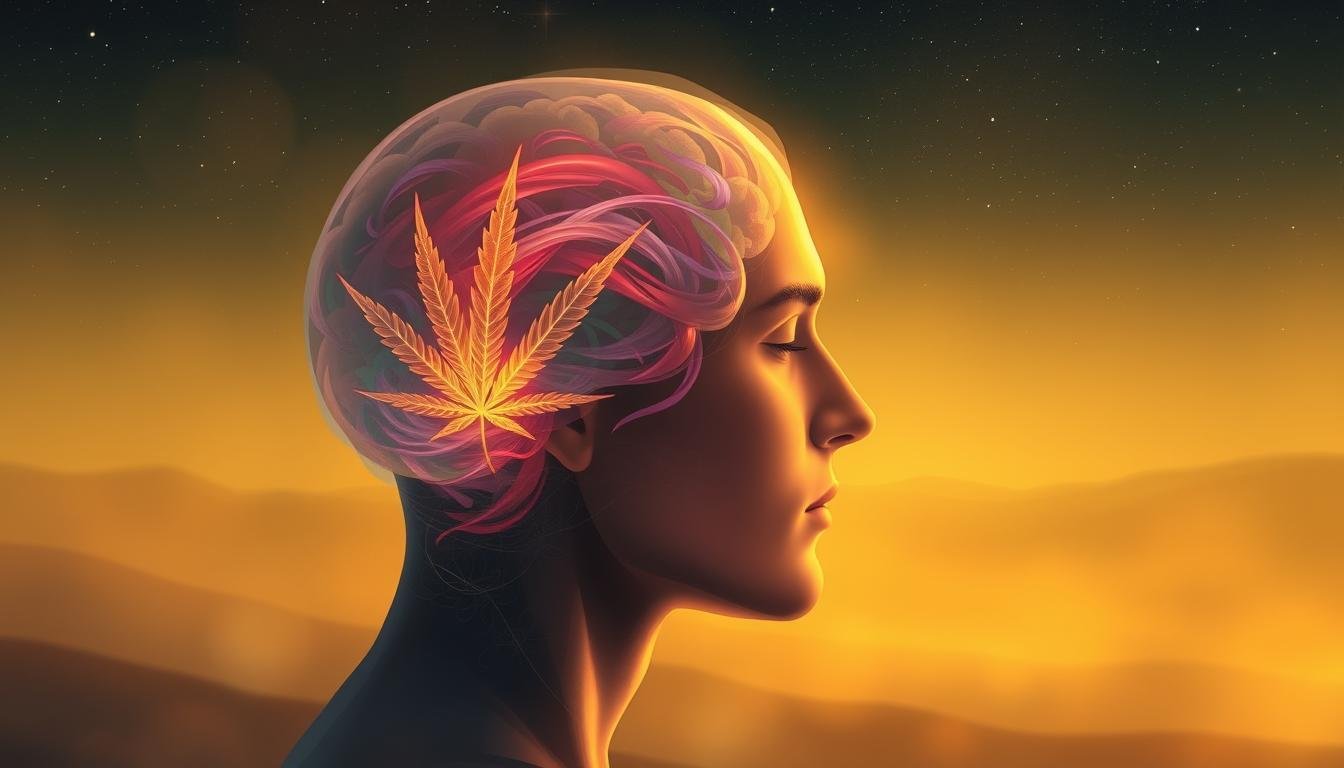Can a once taboo substance really help those with mental health issues? Recent studies have started a big debate. They talk about using cannabis for anxiety and PTSD.
The link between cannabis and mental health is complicated. Some studies say cannabis might help, but others warn of bad side effects.
As we talk more about cannabis, it’s key to look at the science. We need to understand how it affects mental health. This is important for those looking for new treatments.
Key Takeaways
- The connection between cannabis use and mental health outcomes is multifaceted.
- Cannabis may offer relief for certain mental health conditions, such as anxiety and PTSD.
- The potential risks and benefits of using cannabis for mental health need to be carefully considered.
- Ongoing research is crucial to understanding the therapeutic effects of cannabis.
- The science behind cannabis and mental health is continually evolving.
The Science Behind Cannabis and the Brain
Cannabis affects the brain in many ways, including through cannabinoids and neurotransmitters. It has over 100 cannabinoids, with THC and CBD being the most studied. These compounds work with the brain’s endocannabinoid system, changing how we think and feel.
How Cannabinoids Interact with Neurotransmitters
Cannabinoids change how neurotransmitters work in the brain. This affects our mood, memory, and thinking. THC, for example, connects with CB1 receptors, which can change how we feel and see things.
The main points about how cannabinoids and neurotransmitters interact are:
- They can change how dopamine is released, affecting pleasure and reward.
- They can also change serotonin levels, which helps regulate our mood.
- They work with GABA and glutamate, which control how excited neurons get.
The Endocannabinoid System and Emotional Regulation
The endocannabinoid system is key for managing emotions. It uses endocannabinoids like anandamide and 2-AG to handle stress and mood. Using cannabis can change how this system works, affecting our emotions.
A report by the National Academies of Sciences, Engineering, and Medicine shows cannabis affects the brain’s endocannabinoid system. This system is important for managing emotions. The report says we need more research on how cannabis impacts mental health.
Key aspects of the endocannabinoid system’s role in emotional regulation include:
- It helps manage stress through CB1 receptors.
- It affects how we process emotional memories.
- It helps regulate our mood by working with serotonin and dopamine.
Understanding Cannabis Mental Health Interactions
To grasp how cannabis affects mental health, we must explore its components. It contains many compounds, with THC and CBD being the most studied. These interact with our body’s endocannabinoid system, affecting our health and mind.
THC vs. CBD: Contrasting Effects on Mental States
THC and CBD have different impacts on our mental state. THC, the psychoactive part, can make us feel happy but may also cause anxiety or psychosis. CBD, on the other hand, is not psychoactive and may help reduce anxiety and stress. This shows why knowing what’s in cannabis is key.
| Cannabinoid | Psychoactive | Mental Health Effects |
|---|---|---|
| THC | Yes | Euphoria, potential anxiety or psychosis |
| CBD | No | Therapeutic benefits, reduced anxiety |
Terpenes and Their Role in Mental Health Effects
Terpenes, found in cannabis, also affect mental health. Different terpenes, like myrcene and limonene, can change how cannabinoids work. This means they can make cannabis’s effects better or worse. Knowing the terpenes in cannabis can help us understand its mental health effects.
Weed Anxiety Relief: Separating Fact from Fiction
The link between cannabis and anxiety is not simple. Some studies say it can help, while others warn it might make things worse. It’s key for those thinking about using cannabis for anxiety to understand this.
How Cannabis May Reduce Anxiety Symptoms
Cannabis has compounds that affect our mood and anxiety. Studies show that CBD, a part of cannabis, can help reduce anxiety. For example, a study in the Journal of Clinical Psychology found CBD lowered anxiety in people with social anxiety disorder.
| Cannabinoid | Potential Anxiety-Related Effects |
|---|---|
| CBD | Anxiolytic effects, reduced social anxiety |
| THC | Variable effects; can reduce or increase anxiety depending on dosage |
When Cannabis Can Worsen Anxiety
For some, cannabis might help with anxiety, but for others, it could make it worse. High THC doses can cause anxiety or panic. Also, stopping cannabis use can lead to more anxiety.
Knowing the risks and benefits of cannabis for anxiety is important. Talking to a healthcare professional can help figure out the best choice for you.
Cannabis PTSD Treatment: The Therapeutic Potential
Research is showing that cannabis might help treat post-traumatic stress disorder (PTSD). It could be a new way to manage PTSD symptoms. Studies are looking into how cannabis affects different symptoms of PTSD.
Nightmare Reduction and Sleep Improvement
Cannabis might help reduce nightmares and improve sleep for PTSD patients. Studies suggest it can lower the number and intensity of nightmares. This leads to better sleep and a better life quality.
A study in a well-known journal found that cannabis helps PTSD patients sleep better. It also reduces nightmares.

Emotional Processing and Traumatic Memory
Cannabis could also help with emotional processing and managing traumatic memories. The cannabinoids in cannabis work with the body’s endocannabinoid system. This system is key for emotions and memory.
This interaction might help PTSD patients deal with their traumatic experiences. It could also reduce anxiety related to these memories.
“I’ve been using cannabis to help manage my PTSD symptoms, and I’ve noticed a significant reduction in my nightmares and anxiety levels. It’s been a game-changer for me.” – Anonymous PTSD patient
Real-world Patient Experiences
Patients using cannabis for PTSD have shared their experiences. They say it helps with anxiety and hypervigilance. They also report better sleep and overall well-being.
Here’s a summary of what patients have said:
| Symptom | Improvement Reported |
|---|---|
| Nightmares | 75% |
| Anxiety | 60% |
| Sleep Quality | 80% |
The potential of cannabis for PTSD treatment is exciting. It offers hope for those dealing with this complex condition.
Depression and Cannabis: A Complex Relationship
The link between cannabis and depression is complex. It involves both possible benefits and risks. As research on cannabis mental health grows, it’s clear that the relationship is not simple.
Potential Mood-Enhancing Properties
Cannabis has different compounds, like THC and CBD, which are well-studied. Some research shows these might help improve mood. For example, CBD can help with anxiety, which might help people with depression.
- Cannabinoids may affect the brain’s mood centers.
- CBD’s calming effects could help those with depression.
- The cannabis science behind these effects is complex and involves the endocannabinoid system.
Risks of Self-Medication for Depression
While cannabis might help, there’s a big risk of using it to self-medicate for depression. Using it without a doctor’s advice can lead to addiction. It can also make depression worse over time. It’s important to talk to a healthcare professional before using cannabis for mental health.
- Self-medication with cannabis can lead to dependency.
- Using cannabis without supervision can make depression worse.
- Getting professional advice is key for safe cannabis use in cannabis mental health.
Psychosis Risk Factors and Considerations
Cannabis is becoming more popular, and it’s important to know how it affects mental health, like psychosis. The link between cannabis and psychosis is complex. It depends on the type of cannabis and how likely someone is to be affected.

THC and Vulnerability to Psychotic Symptoms
Research shows THC, the active part of cannabis, might raise the chance of psychotic symptoms. The National Academies report found THC can cause psychotic episodes in some users. This is a warning, mainly for those with mental health problems.
“The risk of psychotic symptoms is higher in individuals who use cannabis, particularlly those with a predisposition to psychotic disorders.”
A study on THC and mental health found it can make psychotic symptoms worse or start them in people who are already at risk. This shows it’s key to think about THC levels and the person’s mental health history.
| Factor | Impact on Psychosis Risk |
|---|---|
| THC Content | Higher THC levels may increase psychosis risk |
| Individual Vulnerability | Predisposition to psychotic disorders increases risk |
| Frequency of Use | Frequent cannabis use may elevate risk |
CBD as a Protective Agent Against Psychosis
On the other hand, CBD might help protect against psychosis. Research shows CBD could lessen the bad effects of THC. This might lower the chance of psychotic episodes.
CBD’s antipsychotic properties are being studied. Some research suggests it could help manage psychosis. This makes the THC:CBD ratio in cannabis important. CBD-rich strains might be good for those at risk.
Cannabis Products for Mental Health Support
Cannabis products are becoming a potential help for mental health. Research is still finding out how cannabis affects mental health. People are looking for different cannabis products to help their mental wellbeing.
Strain Selection for Specific Mental Health Concerns
Not all cannabis strains are the same for mental health. Strains with more CBD might help with anxiety without making you feel high. It’s important to look at the THC:CBD ratio and the terpene profile when choosing a strain for mental health.
Consumption Methods and Their Effects on Mental Health
How you use cannabis can change how it affects your mental health. Smoking or vaping gives quick effects, which can help with sudden anxiety. Edibles and tinctures last longer, which might be better for ongoing mental health support. Knowing how to use cannabis can help improve mental health.
Microdosing Approaches for Mental Wellness
Microdosing cannabis means taking very small amounts for mental health benefits without feeling high. This method is becoming popular for improving mood and reducing anxiety. It’s important to start with tiny doses and adjust as needed.
Choosing the right cannabis products, considering the strain, how you use it, and the dose, can help with mental health. Always talk to a healthcare professional before starting any new mental health strategy.
The Research Landscape: What We Know and Don’t Know
Understanding how cannabis affects mental health is complex. We must look at both the good and bad sides. The study of cannabis science is growing fast. New studies are helping us understand how cannabinoids interact with mental health.
Current Clinical Evidence Quality
Research on cannabis mental health includes many types of studies. Some studies show cannabis might help with mental health issues. But, the evidence is still not strong enough.
Many studies have problems like small groups or uneven dosing. These issues make it hard to know for sure what cannabis does.
Ongoing Studies and Future Directions
New research aims to fill in the gaps we don’t know. Future studies will look at different types of cannabis, how much to use, and how to use it. They will also study long-term effects and how cannabis works with other medicines.
As we learn more, we’ll understand better how cannabis affects mental health. This will help us find better treatments and make policies that work.
Legal Access to Medical Cannabis for Mental Health
The rules for using medical cannabis for mental health vary by state. This makes it hard for people looking for relief.
Qualifying Mental Health Conditions by State
States have different lists of conditions that qualify for medical cannabis. Some include mental health issues like PTSD, anxiety, or depression. For example, California allows PTSD, but other states might not.
| State | Qualifying Mental Health Conditions |
|---|---|
| California | PTSD, Anxiety |
| New York | PTSD |
| Florida | PTSD, Anxiety, Depression |
Working with Healthcare Providers
Healthcare providers are key in helping patients get medical cannabis for mental health. They suggest the right strains and amounts based on each patient’s needs.
“The role of the healthcare provider is not just to recommend cannabis but to educate patients on its safe use and potential interactions with other medications.”
It’s important for patients to talk to their healthcare providers. They can explain the legal and medical rules for using cannabis in their state.
Potential Risks and Harm Reduction
Cannabis may help with mental health, but it also has risks. Knowing these risks is important for safe use.
Cannabis Use Disorder in Vulnerable Populations
Cannabis use disorder (CUD) is a big worry, mainly for teens and those with mental health issues. Research shows that starting early and using often can lead to CUD. People at risk should talk to doctors before trying cannabis.
Drug Interactions with Psychiatric Medications
Cannabis can change how psychiatric meds work, sometimes making them less effective or causing more side effects. For example, it might make some antidepressants or antipsychotics work too much. It’s very important to tell doctors about cannabis use to avoid bad reactions.
Age Considerations and Developing Brains
Cannabis can harm young brains, affecting thinking and feelings. Studies say it can mess with brain development in teens and young adults. Parents and guardians should talk to kids about the dangers of cannabis.
Knowing the risks and how to reduce them helps people make smart choices about using cannabis for mental health.
Conclusion
The link between cannabis and mental health is complex. It can offer relief for anxiety and PTSD, but also comes with risks. Studies show how cannabinoids affect our minds in different ways.
It’s key to understand cannabis science to use it wisely. How cannabinoids and terpenes interact with our brain can greatly impact our mental health. We must consider THC vs. CBD levels and our own tolerance when using cannabis.
While cannabis may help some mental health issues, it’s not without dangers. It can lead to addiction, mainly in those who are already vulnerable. It’s important to use cannabis carefully and seek professional advice.
Our goal is to find a balance between the good and bad of cannabis for mental health. By supporting research and talking openly, we can better understand its effects. This will help us make informed choices about using cannabis for our mental well-being.
FAQ
What is the connection between cannabis and mental health?
Cannabis can help or harm mental health, depending on the person and the product. It’s important to know how it affects you.
How do cannabinoids interact with the brain?
Cannabinoids affect neurotransmitters and the endocannabinoid system. This can change how we feel emotions and might help with anxiety or depression.
What is the difference between THC and CBD in terms of mental health effects?
THC can make some people feel anxious or have bad thoughts. CBD might help with anxiety and PTSD without making you feel high.
Can cannabis be used for anxiety relief?
Some people find cannabis helps with anxiety, but it can also make it worse. It depends on the product, how much you take, and your sensitivity.
Is cannabis effective for treating PTSD?
Research shows cannabis might help with PTSD by reducing nightmares and improving sleep. It could also help with emotional processing.
Can cannabis be used to treat depression?
Cannabis might make you feel better, but it’s not a good treatment for depression. It’s risky because it can lead to self-medication.
Does cannabis use increase the risk of psychosis?
THC might cause bad thoughts in some people, but CBD could protect against this. It’s key to know your risk and the product’s makeup.
How can I choose a cannabis product for mental health support?
When picking a cannabis product, think about the strain, how you’ll use it, and the dose. Always talk to a doctor first.
What is the current state of research on cannabis and mental health?
Studies on cannabis and mental health are ongoing. They’re looking at its benefits and risks for different conditions.
How do I access medical cannabis for mental health conditions?
To get medical cannabis, know the qualifying conditions in your state. Work with your doctor and understand the legal side of things.
What are the potential risks associated with cannabis use?
Using cannabis can lead to addiction, bad interactions with other drugs, and issues with young brains. It’s important to use it safely.
What is microdosing, and how can it be used for mental wellness?
Microdosing means taking small amounts of cannabis for benefits without risks. It’s a good way to manage your mental health with a doctor’s help.
How do terpenes influence the mental health effects of cannabis?
Terpenes can change how cannabis affects your mind by working with cannabinoids. Choosing a product with the right terpenes is important.

